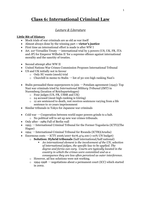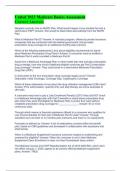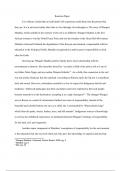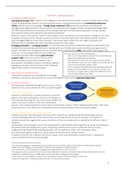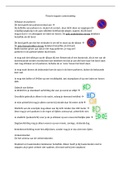Class 6: International Criminal Law
Lecture & Literature
Little Bit of History
Mock trials of war criminals are as old as war itself
Almost always done by the winning part = victor’s justice
First time an international effort is made is after WW I
Art. 227 Versailles Treaty → international trial by 5 powers (US, UK, FR, ITA
and JP) for Emperor Wilhelm II ‘for a supreme offence against international
morality and the sanctity of treaties.
Second attempt after WW II
United Nations War Crimes Commission Proposes International Tribunal
US and UK initially not in favour
o Only SU wants (mock) trial
o Churchill in memo to Stalin → list of 50-100 high ranking Nazi’s
Stalin persuaded these superpowers to join → Potsdam agreement (1945): Top
Nazi war criminals tried by International Military Tribunal (IMT) in
Nuremberg (location of Reichsparteitagen)
o Four judges (US, FR, USSR and UK)
o 24 accused (most high-ranking is Göring)
o 12 are sentenced to death, rest receives sentences varying from a life
sentence to 10 years imprisonment
Similar tribunals in Tokyo for Japanese war criminals
Cold war → Cooperation between world super powers grinds to a halt.
o No political will to set up new war crimes tribunals.
Only after - 1989 Fall of Berlin wall
1993 → International Criminal Tribunal for the Former Yugoslavia (ICTY)(The
Hague)
1994 → International Criminal Tribunal for Rwanda (ICTR)(Arusha)
Enormous costs → ICTY 2006/2007 $276.474.100 (=10% UN budget)
o Solution: Hybrid tribunals (half international/half national)
An international element is the involvement of the UN, selection
of international judges, the specific law to be applied. The
degree and forms can vary. Courts are typically located in the
country in which the crimes were committed and as a
consequence they are less often perceived as outer interference.
o However, ad hoc solutions were not working.
o 1994-1998 → negotiations about a permanent court (ICC) which started
in 2002.

